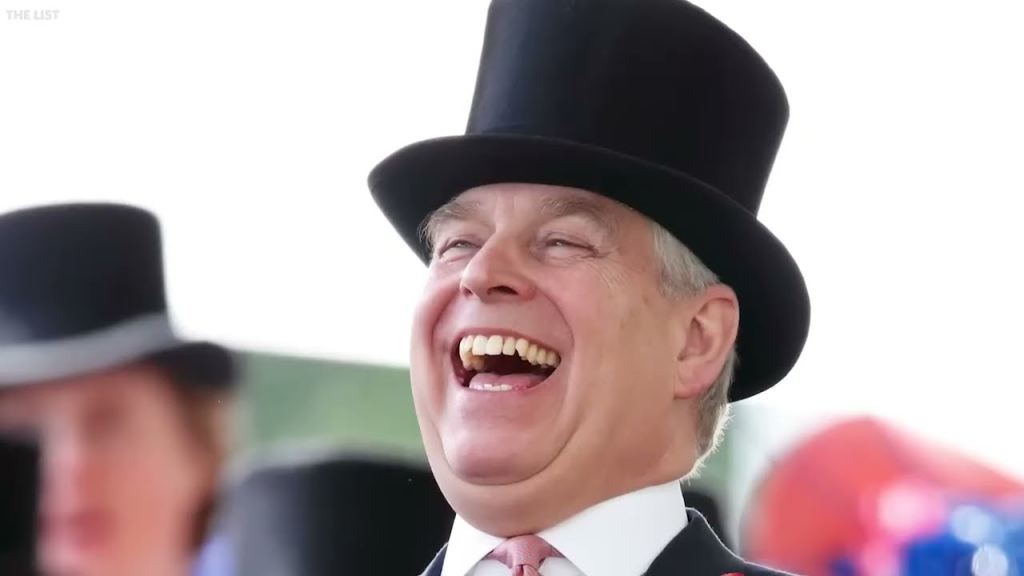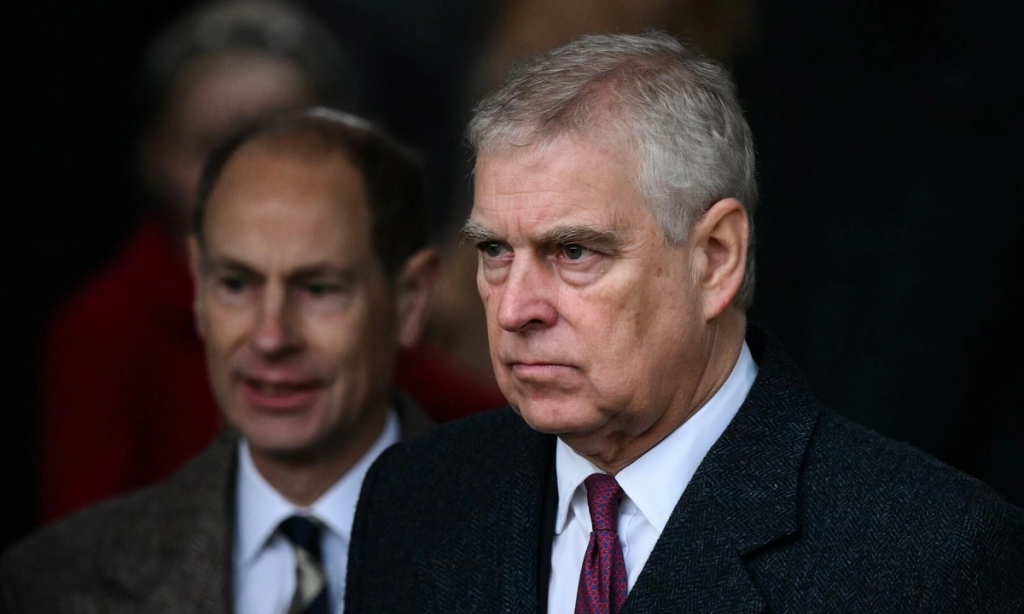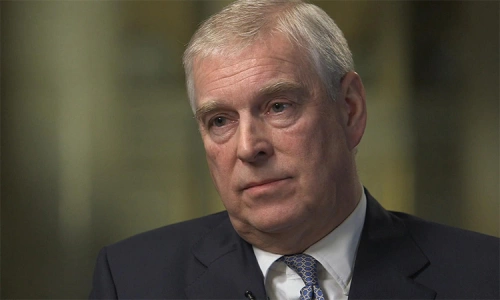He used to glide into Buckingham Palace like he belonged to the walls themselves.
This time, Prince Andrew stepped out of a dark car in London looking like a man walking into judgment. Word had already leaked: King Charles had finally done it. Financial support cut. Titles stripped. The “queen’s favorite son” reduced, on paper at least, to an almost-private citizen.

Behind the headlines of Andrew “storming into London” lies something much colder than family drama. It’s the story of a man who grew up carried by a system built to protect him — and what happens when that system quietly pulls its hand away.
From Queen’s Darling to a Life Built on Support
Born in 1960, Prince Andrew arrived into a world where his future seemed guaranteed. He was the charming third child of Queen Elizabeth II and Prince Philip. For years, he was described as “the Queen’s favorite,” the confident, smiling prince who brought a bit of swagger to the family.
His education was never just about grades. At Gordonstoun, the tough boarding school his father loved, he learned discipline, endurance, and how to perform under scrutiny. Then came the Royal Navy. During the Falklands War in 1982, Andrew flew helicopter missions in real danger, earning genuine respect as more than just a ceremonial royal.
That war hero image carried him into decades of patronages, military titles, charity roles, and public appearances.

But behind all of that sat something crucial: money and structure.
- The Sovereign Grant helped fund official duties.
- Private allowances from the monarch underpinned his lifestyle.
- Military pensions, trusts, and inherited wealth padded everything out.
- Royal Lodge in Windsor—his sprawling home—was held under a long-term lease, but its upkeep, staff and security leaned heavily on royal support.
For Andrew, “financial support” wasn’t just a cheque. It was an entire invisible machine: staff, security, prestige, access, comfort. Lose that, and the facade doesn’t just crack — it starts to slide off the building.
The Interview That Broke His Image
Everything began to unravel in 2019.
His friendship with Jeffrey Epstein had simmered in the background for years, mentioned but not fully confronted. Once Epstein’s crimes were thrust back into public view, the connection became radioactive. Flight logs, photos, visits — all of it pulled Andrew deeper into a spotlight he could not control.
Then came the infamous BBC Newsnight interview.
Andrew arrived stiff, controlled, clearly briefed — and then delivered answers that stunned the world. His claims about not being able to sweat, his flat denial of memories others insisted were real, his oddly detached tone… none of it landed the way he and his team must have hoped.

Instead of explaining, he looked out of touch and unbelievable.
Public reaction was brutal. Memes, ridicule, disbelief. The prince who once seemed confident now appeared defensive and strangely disconnected from reality.
Within days, Buckingham Palace announced he would “step back from public duties.” It was the Queen’s loyalty versus the Crown’s survival — and the Crown won.
Legal Battle, Settlement, and a Reputation That Never Recovered
Across the Atlantic, the civil case of Giuffre v. Prince Andrew pushed the crisis into the courtroom. Virginia Giuffre alleged that Andrew assaulted her when she was a minor — allegations he has consistently denied.
The case was unprecedented: a senior member of the British royal family dragged, in detail, through an American legal process. Lawyers knew every filing might end up on the front page.
In February 2022, the two sides reached an out-of-court settlement.
There was no admission of liability from Andrew — but there was no trial, no exoneration, and no real closing of the wound in the court of public opinion.
Money changed hands. The lawsuit ended.
His reputation did not recover.
Charities dropped him. Universities cut ties. Military patronages and honorary roles were stripped away. For many people, no legal wording could erase the association now burned into his name.
Stripped of Titles: Charles Draws a Line
By October 30, 2025, King Charles had moved from caution to finality.
Buckingham Palace announced that the process had begun to remove Andrew’s style, titles, and honors. By early November, letters patent were issued. Official notices confirmed it:
- No “His Royal Highness.”
- No “Prince Andrew” in formal records.
- No public-facing royal role.
It wasn’t just a paperwork change. It was a message.
For centuries, royal titles seemed untouchable, even when royals behaved badly. But in a post-Epstein, post-interview world, Charles appears willing to do what once felt unthinkable: use the Crown’s tools against a family member to protect the institution.
Andrew didn’t just lose style and status. He lost the soft power that came with them — the invitations, the doors that opened automatically, the subtle security of being “untouchable.”
When the Money Stops
The financial blow landed next.
Reports suggest Andrew once relied on a private allowance — often speculated around seven figures — alongside inherited wealth and trust funds. Add to that the staggering cost of life at Royal Lodge:
- Staff
- Grounds and historic maintenance
- Heating, repairs, and constant upkeep
- Private security on top of any official protection
Without significant royal support, those numbers stop being abstract. They become a calculator, a red line, and very uncomfortable choices.
Some reports mention one-off relocation payments or reduced stipends. Others suggest support has been cut far more harshly. The palace doesn’t confirm figures. That uncertainty is part of the pressure: the public sees “he’s cut off,” but the internal reality is messy, negotiated, and partly hidden.
What is clear is this:
- Pitch@Palace and other ventures have largely been wound down.
- Corporate filings show dissolutions, transfers, and shrinking assets.
- Patronages are gone; “soft influence” positions have vanished.
The prince who once lived wrapped in institutional padding is now exposed to something most royals never fully face: financial reality.
Storming Back Into London – But to What?
So when Prince Andrew “storms into London” after King Charles removes financial support, it’s not just a dramatic image for a headline.
It’s a man walking back into the city that once celebrated him:
- as a war pilot,
- as a working royal,
- as the queen’s favored son…
…now recast as a symbol of how far royal privilege can fall.
He is still wealthy compared to ordinary people. He still has connections and access. But the scaffolding of guaranteed relevance, status, and funding has been stripped away. Every security contract, every staff role, every light left on in Royal Lodge now raises the same brutal question:
Who pays for this — and why?
For King Charles, the decision sends a warning that extends beyond Andrew:
No title is safe if it endangers the Crown.
No level of seniority guarantees immunity forever.
For Andrew, it’s the end of one life and the uncomfortable beginning of another — one where he cannot hide behind “duty” or “service,” because those roles have been taken away.
Leave a Reply